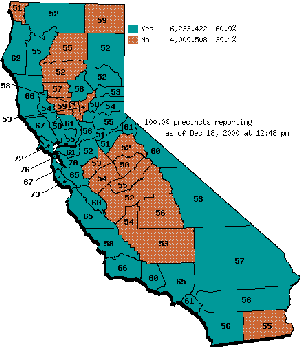Feature:
Battle
Over
California's
Proposition
36
to
Head
to
Court
7/7/06
Last week, the California legislature voted to approve changes to Proposition 36, the state's "treatment not jail" law, that would alter the law's basic philosophy. This week, Prop. 36 supporters are waiting for Gov. Arnold Schwarzenegger to sign the bill into law. Then they will immediately file suit to have the new law overturned.
The bill passed last week, SB 1137, toughens Prop. 36 by allowing judges to sentence people who relapse into drug use to periods up to five days of "flash incarceration." Originally drafted by law enforcement and California drug court professionals -- the groups who opposed Prop. 36 from the beginning -- the bill ultimately introduced by Sen. Denise Ducheny (D-San Diego) managed to win bipartisan support at the statehouse in spite of warnings from the legislative counsel's office that it was unconstitutional. "Legislation that would authorize a sentence of incarceration for a first, second, or third drug-related probation violation, if enacted, would constitute an amendment of Proposition 36 that would both not further that initiative statute and be consistent with its purposes," the office wrote last year. "Therefore, the legislation could not take effect without voter approval," the office concluded. While Prop. 36 supporters argue that jailing people who relapse is counterproductive, Ducheny and her law enforcement allies disagree. "Fundamentally, this is not giving them jail time for the drug offense but to say, 'Look, we gave you that opportunity and you decided, for whatever reason, not to take advantage of it... You didn't meet your responsibility to us, so we need some accountability,'" Ducheny said as the bill was being debated. But Assemblyman Mark Leno (D-San Francisco), chairman of the Assembly Public Safety Committee, disagreed. "I have long been opposed to this concept of flash incarceration," he said before voting against the bill. "There's no evidence at all that it works." Another strong legislative friend of Prop. 36, Assemblywoman Jackie Goldberg (D-Los Angeles) criticized the legislature for backing changes that "fly in the face of the 61.5% of the people who voted for" the initiative. The Drug Policy Alliance (DPA), which has fought to see that Prop. 36 is properly implemented and adequately funded and which bitterly fought the Ducheny bill, is prepared to go to court to stop what it sees as the legislature's unconstitutional attack on the ballot measure. "In passing SB 1137, the legislature made changes to Prop. 36 that go against the intent of the initiative as passed by voters, and the legislature cannot do that. Under state law, the only changes the legislature can make to an initiative are changes that further its original intent, and this does the opposite," said Margaret Dooley of the Drug Policy Alliance's Southern California office. "They changed a treatment initiative into an incarceration program where people in treatment can be thrown in jail. That violates the initiative's intent, and we will be asking the courts to decide that constitutional issue," she told DRCNet. SB 1137 also includes another constitutionally questionable provision. In an effort to block court challenges, the new law says that if any part of the legislation is found to be unconstitutional, the entire law will go to the popular ballot. That clause should arouse the ire of supporters of the initiative process, which is widely used in California, said DPA head of legal affairs Dan Abrahamson. "Once the public begins to understand the radical and unprecedented nature of that clause, you're going to see a variety of organizations who've used the initiative process in the past come out of the woodwork and join the challenge of this clause," he told the Los Angeles Times. "It's not just DPA, but all sorts of organizations across the political spectrum who have used the initiative process over the last umpteen years coming out of the woodwork to challenge this ridiculous provision," Abrahamson said. "If this provision is allowed to stand, we can kiss the initiative process goodbye," added Dooley. "Any politician who doesn't like an initiative could write a bill to change it, then if it goes to court and is found unconstitutional, he could take it to a public vote. Then another politician could repeat the process," she argued. "It is really disappointing that our legislators would vote for something that is clearly unconstitutional," Dooley said. "We need the courts to decide these matters now and correct this legislative mistake."
|

